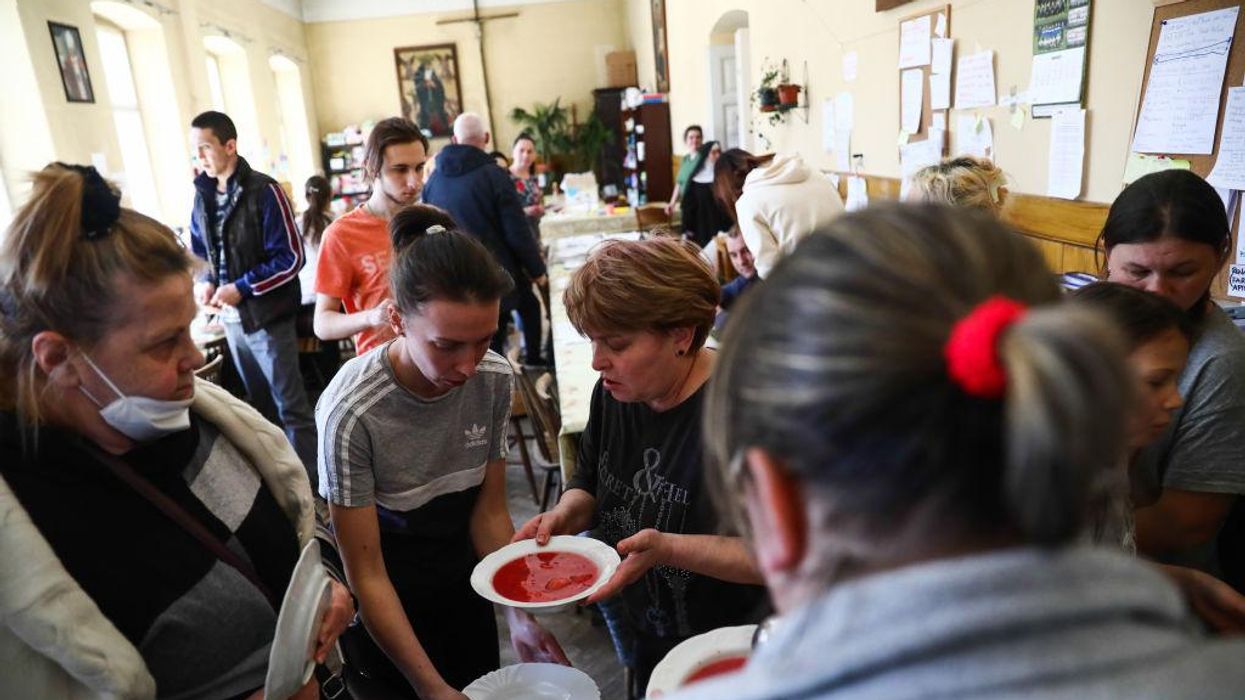
Stringer/Anadolu Agency via Getty Images

'Weaponizing humanitarian aid in order to share the gospel'
Samaritan's Purse, Jews for Jesus, and other Christian groups aiding Ukrainian refugees in Europe and Israel are being criticized for "weaponizing" humanitarian aid by also sharing their faith, according to reports surfacing online.
The missionary groups have reportedly been coupling evangelistic efforts with the provision of humanitarian aid to the tens of thousands of Ukrainian residents who have fled the country amid Russia's unprovoked invasion.
They are routinely handing out Bibles and sharing the gospel message with the refugees while also providing them with food, shelter, medicine, and other physical needs.
"Ukrainian families are hurting and in desperate need of physical aid and prayer during this difficult time," Samaritan’s Purse president and evangelist Franklin Graham said to the Tribune Papers earlier this month. "We are deploying life-saving medical care to aid people who are suffering. We want to meet the needs of these families in their darkest moments while pointing them to the light and hope of Jesus Christ."
Susan Perlman, one of the founders of Jews for Jesus, an organization with a staff spread across Eastern Europe, told the Times of Israel in a statement, "We give people food and medicine and Bibles and gas for their cars to get them moving. We see the Bible as just as practical as all these other things."
For these groups and others, the efforts are an attempt to model Jesus' behavior and obey his commands to help the suffering and spread the gospel to all nations.
But not everyone sees the evangelistic efforts as appropriate.
In a report published on OpIndia, a staff writer complained that "preying upon the vulnerable has always been the standard modus operandi of the evangelist missionaries."
"This very same strategy is back in action, this time in Ukraine, as millions fleeing the war are being targeted by American missionaries for conversion," the report said. "As the refugees look to cross over to Poland and relative safety, they are being pestered by American preachers asking them to 'love Jesus.'"
The article specifically cited Samaritan's Purse as one of the missionary agencies supposedly doing more harm than good by sharing their religious beliefs.
At the Ukraine/Poland border. Tired women and children leaving their country. They\u2019re being pestered by American preachers telling them they all need to accept Jesus as their saviour and their lives will be better. Receiving a lot of eye rolls in response.pic.twitter.com/Fjyc8ppKVe— Ben Lewis (@Ben Lewis) 1647428125
Others took issue with Messianic Jewish groups sharing the gospel with specifically Jewish Ukrainian refugees.
Rabbi Tovia Singer, the head of Outreach Judaism, an organization set up to counter Christian missions to Jewish people, claimed Messianic groups were "weaponizing humanitarian aid in order to share the gospel."
Shannon Nuszen, who leads a nonprofit called Beyneynu that tracks Christian missionary activity in Jewish communities, added to the Times of Israel that such outreach efforts are "disrespectful, offensive and sinister."
“They are targeting vulnerable people who are looking for food and shelter to rob them of their faith," Nuszen said, adding that practices such as distributing Bibles are "disrespectful, it’s crossing the line, it’s offensive. It’s not the way that a true friend would act."
"They have their hands in any place where there are vulnerable Jews, whether it’s refugees, kids on college campuses, kids on summer vacation," she continued.
This disagreement holds special significance because Messianic Jews are ethnic Jews who believe Jesus Christ is the Messiah spoken of in Jewish tradition and literature, including the Old Testament. Practicers of Judaism believe the Messiah, or savior, is yet to come.
The Messianic groups, however, have responded to criticism by arguing the gospel is an essential part of their message and insisting that acceptance of Christ is in no way a prerequisite for receiving physical aid.
"We can’t help but pray for people, share the gospel with them. People are coming to know the Lord. It’s not in place of caring for their immediate physical needs, but it is a part of who we are," Perlman said. "It’s not, 'You have to read this Bible in order to get help from us,' but we think that the Bible is a great source of help and encouragement and hope in times like these."
Mitch Glaser, who runs New York-based Chosen People Ministries, a Messianic group helping care for around 230 people at a Christian camp outside Warsaw, shared a similar sentiment.
"We literally want to follow the model that Jesus set in the gospels, where he cared for people who were needy," Glaser said.